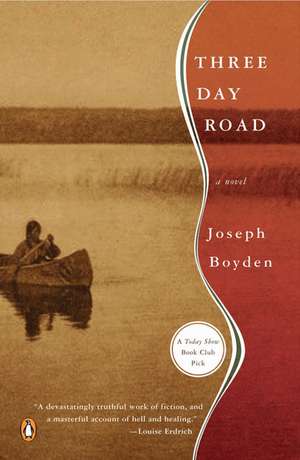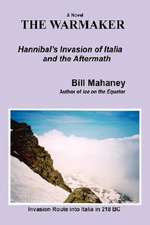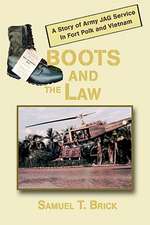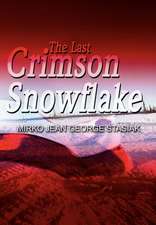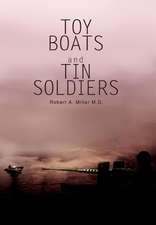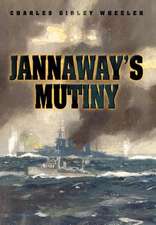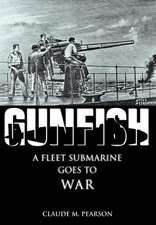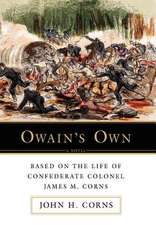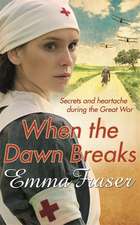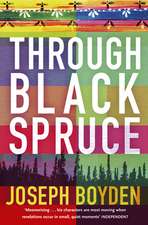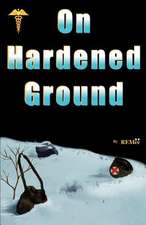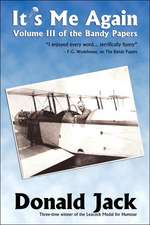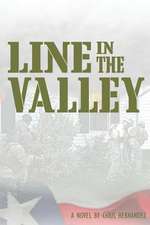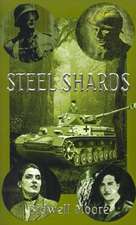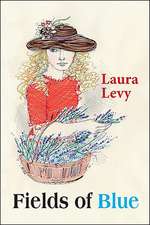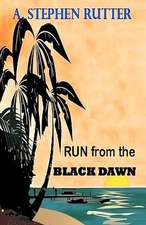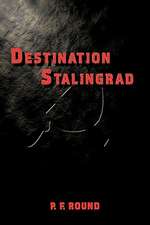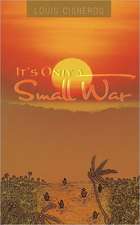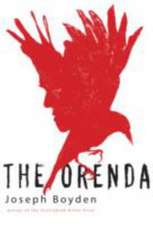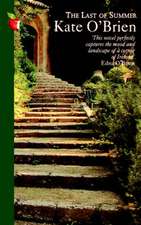Three Day Road
Autor Joseph Boydenen Limba Engleză Paperback – 31 mar 2006 – vârsta de la 18 ani
Vezi toate premiile Carte premiată
Set in Canada and the battlefields of France and Belgium, Three-Day Road is a mesmerizing novel told through the eyes of Niska—a Canadian Oji-Cree woman living off the land who is the last of a line of healers and diviners—and her nephew Xavier.
At the urging of his friend Elijah, a Cree boy raised in reserve schools, Xavier joins the war effort. Shipped off to Europe when they are nineteen, the boys are marginalized from the Canadian soldiers not only by their native appearance but also by the fine marksmanship that years of hunting in the bush has taught them. Both become snipers renowned for their uncanny accuracy. But while Xavier struggles to understand the purpose of the war and to come to terms with his conscience for the many lives he has ended, Elijah becomes obsessed with killing, taking great risks to become the most accomplished sniper in the army. Eventually the harrowing and bloody truth of war takes its toll on the two friends in different, profound ways. Intertwined with this account is the story of Niska, who herself has borne witness to a lifetime of death—the death of her people.
In part inspired by the legend of Francis Pegahmagabow, the great Indian sniper of World War I, Three-Day Road is an impeccably researched and beautifully written story that offers a searing reminder about the cost of war.
At the urging of his friend Elijah, a Cree boy raised in reserve schools, Xavier joins the war effort. Shipped off to Europe when they are nineteen, the boys are marginalized from the Canadian soldiers not only by their native appearance but also by the fine marksmanship that years of hunting in the bush has taught them. Both become snipers renowned for their uncanny accuracy. But while Xavier struggles to understand the purpose of the war and to come to terms with his conscience for the many lives he has ended, Elijah becomes obsessed with killing, taking great risks to become the most accomplished sniper in the army. Eventually the harrowing and bloody truth of war takes its toll on the two friends in different, profound ways. Intertwined with this account is the story of Niska, who herself has borne witness to a lifetime of death—the death of her people.
In part inspired by the legend of Francis Pegahmagabow, the great Indian sniper of World War I, Three-Day Road is an impeccably researched and beautifully written story that offers a searing reminder about the cost of war.
| Toate formatele și edițiile | Preț | Express |
|---|---|---|
| Paperback (2) | 50.33 lei 3-5 săpt. | +27.42 lei 7-11 zile |
| Orion Publishing Group – 5 apr 2006 | 50.33 lei 3-5 săpt. | +27.42 lei 7-11 zile |
| Penguin Books – 31 mar 2006 | 123.09 lei 3-5 săpt. |
Preț: 123.09 lei
Nou
Puncte Express: 185
Preț estimativ în valută:
23.55€ • 24.67$ • 19.52£
23.55€ • 24.67$ • 19.52£
Carte disponibilă
Livrare economică 18 martie-01 aprilie
Preluare comenzi: 021 569.72.76
Specificații
ISBN-13: 9780143037071
ISBN-10: 0143037072
Pagini: 354
Dimensiuni: 129 x 209 x 17 mm
Greutate: 0.26 kg
Editura: Penguin Books
ISBN-10: 0143037072
Pagini: 354
Dimensiuni: 129 x 209 x 17 mm
Greutate: 0.26 kg
Editura: Penguin Books
Recenzii
"A beautifully written and haunting story of survival and innocence shattered, of friendship, death, redemption and love of the land." —Isabel Allende
Notă biografică
Joseph Boyden is a Canadian of Irish, Scottish, and Metis roots. He divides his time between northern Ontario and Louisiana, where he teaches writing at the University of New Orleans.
Extras
Ekiiwaniwahk
Returning
For many days I've hidden in the bush by the town, coming out when I hear the call, watching carefully for him. This is an ugly town, far bigger than Moose Factory, even. This is a town I have not been to before, a place to which I will never return. More wemistikoshiw than I want to see walk the dusty streets in their funny clothes, dressed as if for colder weather, though the sun above us is high and full of summer heat.
I hide well during the day, but when the sound of it reaches my ears I have no choice but to come out and walk among them. They stare and point and talk about me as if they've not seen one of me before. I must look a thin and wild old woman to them, an Indian animal straight out of the bush. Soon I will have only enough food left to get us home, and so I've taken to setting snares around my camp. The rabbits, though, seem as afraid of this place as I am.
Where it comes to rest is just a wooden platform with a small shelter to hide in when the weather turns. The road that leads up to it is covered in dust. Automobiles, just like the one Old Man Ferguson back in Moose Factory drives, rush there at the same time every other day. I have watched them pour what smells like lantern oil onto the road, but still the dust floats up so that it coats the inside of my nose and bothers my eyes. At least I can hide a little in the dust, and not so many of them can see me.
The place where I go is covered in soot so that I feel the need to bathe each day that I return from there without him. I have stopped sleeping at night, worried that the words were wrong, that he will never come, that I will die here waiting.
Again today I hear the call. Again today I wait for the others to get there before me, before I step among them.
The old ones call it the iron toboggan. As I watch this thing approach, whistle blowing and smoke pouring from the chimney in the summer heat, I see nothing of the toboggan in it. More frightening than the crowd of people around me is the one bright eye shining in the sunlight and the iron nose that sniffs the track.
Too many people. I've never been around so many wemistikoshiw at one time. They walk and jostle and talk and shout to one another. I look out at the spruce across the tracks. Blackened by soot, they bend in defeat.
I stand back in the shadow of the shelter and watch as the people in front of me tense, then move closer to the track as it approaches, not further away as I would have expected. The women in the crowd look nothing like me, wear long dresses made of too much material and big hats. They hold bowed cloth shields above their heads. The men are dressed in black and brown and grey suits, and the shoes upon their feet are shiny, so shiny that I wonder what kind of animal the leather has come from. All of the men wear hats, too. All these people wearing hats in summer. I do not understand much of the wemistikoshiw.
It whistles like a giant eagle screaming, so close now that I must cover my ears.
I have paddled by myself against the big river's current for many days to get here. No mind. My one living relation died in a faraway place, and I am here to greet his friend Elijah. Elijah Whiskeyjack is as close to a relation as I still have, and I will paddle him home.
Joseph Netmaker brought the letter out to me. Winter had just started to settle itself into the country. Joseph walked on snowshoes from the town. "This is for you, Niska," he said. "It is from the Canadian boss, their hookimaw."
As soon as I saw the brown letter, the English words written upon it, I knew what it contained. I sat down beside the fire and stirred at it with a stick while Joseph read, first out loud and in his stumbling English, then for me in our language.
"'Serial No. 6711. Deeply regret to inform you, Private First Class Xavier Bird, infantry, officially reported died of wounds in the field, November 3, 1918. Director of Records.' "
I waited for more, but that was all. When Joseph left, I was alone.
Many moons later, when the winter ice was leaving and travel was difficult, Joseph came back with another letter. He explained that it was in reference to Elijah, and that Old Man Ferguson had given it to him to give to me since I was the closest thing to a relation that Elijah had.
The letter said that Elijah had been wounded, that he had only one leg now, that he had tried to rescue another soldier, was given a medal for bravery. It said that although weak, he had healed enough to travel and was expected to arrive in the same town from which he and Xavier had left so long ago.
I had Joseph explain to me how the wemistikoshiw calendar worked, what month I was to be there, and I made careful preparations to journey by canoe to that town where Elijah would arrive. I left early in the summer and paddled up the river. It was difficult. I am older now, but I travelled light. Joseph had asked to come along, but I told him no.
I went alone.
I watch the beast pull up and give one last great sigh, as if it is very tired from the long journey, smoke pouring from its sides. People wave from the windows and people on the ground wave back, just as I have watched them do for days. Then men and women and children who have arrived start stepping down into the arms of others. I see a few soldiers and search among them for Elijah's face with his sly grin. The crowd begins to thin, and once again I do not see an Indian soldier with one leg.
I am turning to leave when I see through one of the windows the silhouette of a man inside. He walks slowly along the aisle, on crutches, in a uniform, a small bag slung over his shoulder. I step away from the shadow of the wall.
He wears a hat, just like the wemistikoshiw do, but this one is of their army and I cannot see his face for his looking down as he slowly makes his way down the steps on his crutches. He is an old man, I think. So skinny. This cannot be the Elijah I know. One leg of his pants is pinned up and hangs down a little way, empty.
When he is off the steps I begin to back away, thinking it is not him. He looks up and I see his face, thin and pale, high cheekbones, and ears sticking out from beneath his hat. I stumble a little, the blood rushing away from my head. The ghost of my nephew Xavier looks at me.
He sees me at the same moment, and I watch as his eyes take a long time to register what they see, but when they do he begins to rock back and forth on his crutches. He falls to the ground. I rush up to him, kneel beside him, grab his warm hands. He is no ghost. I hold him to me. His heart beats weakly. I am struck suddenly that he is very ill.
"Nephew," I whisper. "You are home. You are home."
I hug him, and when he opens his eyes, I look into them. They are glassy. Even in the shadows of the station his pupils are pinpricks.
"I was told you were dead, Auntie," he whispers.
"And I was told you were, too," I say.
We sit on the ground for a while, both of us too weak for the moment to get up. We are crying, looking at one another. A small group of wemistikoshiw gathers and stares at us. I help Nephew up so that we can get away, get to the river where he can drink water and I can better protect him.
We do not stay in the town long. It makes me too nervous. Automobiles, they are everywhere. We must cross the dusty road that they travel upon before we can get to the river where I keep my canoe. Nephew walks slowly on his crutches, his eyes cast down. People stare at us, at him. There was a time before he left that he would have stared back, he and Elijah both, not intimidated by them.
What of Elijah? If they made a mistake about Nephew's death, maybe they made one about Elijah. I want to ask, but will wait until he is ready to speak.
We try to cross the road but an automobile honks like a goose and swerves around. I watch carefully and must wait a long time until I can judge that we can cross safely.
I lead Nephew down to the riverbank. I have left the canoe a good walk down the rocky shore. I tell him that it is best for him to wait while I go ahead and get it. He doesn't respond, just sits heavily on the bank. Quickly as I can, I make my way. I am silly to worry about leaving him alone for a few minutes. In the last years he has experienced more danger than anyone should experience in a hundred lives. But I worry anyway.
As I approach him in my canoe, I can see that he has his jacket off and is holding his thin arm in one hand. I get closer and see that he has stuck something into his arm, something he pulls out just as he looks up and sees me. His body has gone relaxed and his eyes look guilty for a moment, but as I get to where he is they are like the dark river in the sun.
I feel better once he is in the canoe and we are paddling away from the town. It smells the same as Moose Factory, the scent of burning wood not quite masking another decaying smell below it. He paddles for a while, but he is listless.
I tell Xavier to lie back on his pack and rest, that we are heading north and I have the current with me for once and it is easy going. He does not seem to hear me. I touch my paddle tip to his shoulder. He turns. I say it again and he watches my mouth intently. He lies back without speaking, and I paddle us back into the bush, looking every once in a while at his thin face in the sunlight, this face that has grown old too quickly. He sleeps, but his sleep is not restful. He twitches and his hands shake. He calls out and this wakes him up. He sits and dips his hand in the river, runs it across his face. His shirt is soaked through with sweat. He is very sick. Some fever is burning him up from the inside. I push down the river in silence.
I take my time, find it pleasant not to have to work constantly, not to fight the current. Only a couple of days ago I battled with every stroke until my arms were dead things and my lower back felt broken. Now paddling home I have the luxury of the current that runs north with me to the Great Salt Bay, to the place the ones who took my nephew call Hudson Bay. It cost me a week of hard work to make my way up the river, but with the wind and weather in my favour, the river is a three-day paddle home. I have many questions for Xavier, and I am like a child inside, waiting to ask them. But I am patient. I am good at waiting.
We do not get far before the sun lets me know that it is time to prepare a camp. I want to go easy with him anyway. No rush. It is summer.
The insects are heaviest just before and during dusk, and so I look for an island in the river that will afford us some relief from them. Ahead, a good one appears with a sandy beach and dead wood scattered about for a fire.
We beach the canoe and I busy myself collecting wood. Nephew tries to help but his crutches sink into the soft sand and he grows frustrated. I want to cry, watching him from the corner of my eye as he bends and tries to pick up wood and then finally sits and pulls rocks to him slowly, making a fire circle.
I cut long saplings with my axe and drag them to him, tie them together at one end and construct the frame for a small teepee. I pull a length of canvas from the canoe and tie it to the frame. The sky right now looks like it will give a starry night, but the wind tells me something different. We are not so far away from the bay that a storm can't rush up on us. Once I have dragged our few belongings into the teepee, I pull food from a pack and lay it out. Nephew has gotten a nice fire started.
On one rock I place salted fish, on another some moosemeat and on a third, blueberries picked fresh from the bush. I take a stick and sharpen its end. Nephew stares at the river. I lace a length of meat onto the stick and heat it by the flame. He turns his head in recognition when it begins to warm and its scent comes up.
"I have not smelled that in a long time," he says, smiling shyly. These are the first words he has said since the town.
I give him some food, but he doesn't eat. His skin is the colour of cedar ash in the setting sun.
That night I crawl into the teepee, tell him to sleep when he is ready. He stares at the fire.
Hours later, I awake to a light rain tapping on the canvas. I open my eyes and listen to it. The fire smoke in the rain is a pleasant scent. I realize I lie here alone. Even with the weather, Nephew has not come in. I peer outside. The fire sizzles and pops, and my fear returns when I see he doesn't sit beside it.
There is no sleep the remainder of the night. I toss in my blanket. My body hums with Nephew's pain and with the realization that he has come home only to die.
Returning
For many days I've hidden in the bush by the town, coming out when I hear the call, watching carefully for him. This is an ugly town, far bigger than Moose Factory, even. This is a town I have not been to before, a place to which I will never return. More wemistikoshiw than I want to see walk the dusty streets in their funny clothes, dressed as if for colder weather, though the sun above us is high and full of summer heat.
I hide well during the day, but when the sound of it reaches my ears I have no choice but to come out and walk among them. They stare and point and talk about me as if they've not seen one of me before. I must look a thin and wild old woman to them, an Indian animal straight out of the bush. Soon I will have only enough food left to get us home, and so I've taken to setting snares around my camp. The rabbits, though, seem as afraid of this place as I am.
Where it comes to rest is just a wooden platform with a small shelter to hide in when the weather turns. The road that leads up to it is covered in dust. Automobiles, just like the one Old Man Ferguson back in Moose Factory drives, rush there at the same time every other day. I have watched them pour what smells like lantern oil onto the road, but still the dust floats up so that it coats the inside of my nose and bothers my eyes. At least I can hide a little in the dust, and not so many of them can see me.
The place where I go is covered in soot so that I feel the need to bathe each day that I return from there without him. I have stopped sleeping at night, worried that the words were wrong, that he will never come, that I will die here waiting.
Again today I hear the call. Again today I wait for the others to get there before me, before I step among them.
The old ones call it the iron toboggan. As I watch this thing approach, whistle blowing and smoke pouring from the chimney in the summer heat, I see nothing of the toboggan in it. More frightening than the crowd of people around me is the one bright eye shining in the sunlight and the iron nose that sniffs the track.
Too many people. I've never been around so many wemistikoshiw at one time. They walk and jostle and talk and shout to one another. I look out at the spruce across the tracks. Blackened by soot, they bend in defeat.
I stand back in the shadow of the shelter and watch as the people in front of me tense, then move closer to the track as it approaches, not further away as I would have expected. The women in the crowd look nothing like me, wear long dresses made of too much material and big hats. They hold bowed cloth shields above their heads. The men are dressed in black and brown and grey suits, and the shoes upon their feet are shiny, so shiny that I wonder what kind of animal the leather has come from. All of the men wear hats, too. All these people wearing hats in summer. I do not understand much of the wemistikoshiw.
It whistles like a giant eagle screaming, so close now that I must cover my ears.
I have paddled by myself against the big river's current for many days to get here. No mind. My one living relation died in a faraway place, and I am here to greet his friend Elijah. Elijah Whiskeyjack is as close to a relation as I still have, and I will paddle him home.
Joseph Netmaker brought the letter out to me. Winter had just started to settle itself into the country. Joseph walked on snowshoes from the town. "This is for you, Niska," he said. "It is from the Canadian boss, their hookimaw."
As soon as I saw the brown letter, the English words written upon it, I knew what it contained. I sat down beside the fire and stirred at it with a stick while Joseph read, first out loud and in his stumbling English, then for me in our language.
"'Serial No. 6711. Deeply regret to inform you, Private First Class Xavier Bird, infantry, officially reported died of wounds in the field, November 3, 1918. Director of Records.' "
I waited for more, but that was all. When Joseph left, I was alone.
Many moons later, when the winter ice was leaving and travel was difficult, Joseph came back with another letter. He explained that it was in reference to Elijah, and that Old Man Ferguson had given it to him to give to me since I was the closest thing to a relation that Elijah had.
The letter said that Elijah had been wounded, that he had only one leg now, that he had tried to rescue another soldier, was given a medal for bravery. It said that although weak, he had healed enough to travel and was expected to arrive in the same town from which he and Xavier had left so long ago.
I had Joseph explain to me how the wemistikoshiw calendar worked, what month I was to be there, and I made careful preparations to journey by canoe to that town where Elijah would arrive. I left early in the summer and paddled up the river. It was difficult. I am older now, but I travelled light. Joseph had asked to come along, but I told him no.
I went alone.
I watch the beast pull up and give one last great sigh, as if it is very tired from the long journey, smoke pouring from its sides. People wave from the windows and people on the ground wave back, just as I have watched them do for days. Then men and women and children who have arrived start stepping down into the arms of others. I see a few soldiers and search among them for Elijah's face with his sly grin. The crowd begins to thin, and once again I do not see an Indian soldier with one leg.
I am turning to leave when I see through one of the windows the silhouette of a man inside. He walks slowly along the aisle, on crutches, in a uniform, a small bag slung over his shoulder. I step away from the shadow of the wall.
He wears a hat, just like the wemistikoshiw do, but this one is of their army and I cannot see his face for his looking down as he slowly makes his way down the steps on his crutches. He is an old man, I think. So skinny. This cannot be the Elijah I know. One leg of his pants is pinned up and hangs down a little way, empty.
When he is off the steps I begin to back away, thinking it is not him. He looks up and I see his face, thin and pale, high cheekbones, and ears sticking out from beneath his hat. I stumble a little, the blood rushing away from my head. The ghost of my nephew Xavier looks at me.
He sees me at the same moment, and I watch as his eyes take a long time to register what they see, but when they do he begins to rock back and forth on his crutches. He falls to the ground. I rush up to him, kneel beside him, grab his warm hands. He is no ghost. I hold him to me. His heart beats weakly. I am struck suddenly that he is very ill.
"Nephew," I whisper. "You are home. You are home."
I hug him, and when he opens his eyes, I look into them. They are glassy. Even in the shadows of the station his pupils are pinpricks.
"I was told you were dead, Auntie," he whispers.
"And I was told you were, too," I say.
We sit on the ground for a while, both of us too weak for the moment to get up. We are crying, looking at one another. A small group of wemistikoshiw gathers and stares at us. I help Nephew up so that we can get away, get to the river where he can drink water and I can better protect him.
We do not stay in the town long. It makes me too nervous. Automobiles, they are everywhere. We must cross the dusty road that they travel upon before we can get to the river where I keep my canoe. Nephew walks slowly on his crutches, his eyes cast down. People stare at us, at him. There was a time before he left that he would have stared back, he and Elijah both, not intimidated by them.
What of Elijah? If they made a mistake about Nephew's death, maybe they made one about Elijah. I want to ask, but will wait until he is ready to speak.
We try to cross the road but an automobile honks like a goose and swerves around. I watch carefully and must wait a long time until I can judge that we can cross safely.
I lead Nephew down to the riverbank. I have left the canoe a good walk down the rocky shore. I tell him that it is best for him to wait while I go ahead and get it. He doesn't respond, just sits heavily on the bank. Quickly as I can, I make my way. I am silly to worry about leaving him alone for a few minutes. In the last years he has experienced more danger than anyone should experience in a hundred lives. But I worry anyway.
As I approach him in my canoe, I can see that he has his jacket off and is holding his thin arm in one hand. I get closer and see that he has stuck something into his arm, something he pulls out just as he looks up and sees me. His body has gone relaxed and his eyes look guilty for a moment, but as I get to where he is they are like the dark river in the sun.
I feel better once he is in the canoe and we are paddling away from the town. It smells the same as Moose Factory, the scent of burning wood not quite masking another decaying smell below it. He paddles for a while, but he is listless.
I tell Xavier to lie back on his pack and rest, that we are heading north and I have the current with me for once and it is easy going. He does not seem to hear me. I touch my paddle tip to his shoulder. He turns. I say it again and he watches my mouth intently. He lies back without speaking, and I paddle us back into the bush, looking every once in a while at his thin face in the sunlight, this face that has grown old too quickly. He sleeps, but his sleep is not restful. He twitches and his hands shake. He calls out and this wakes him up. He sits and dips his hand in the river, runs it across his face. His shirt is soaked through with sweat. He is very sick. Some fever is burning him up from the inside. I push down the river in silence.
I take my time, find it pleasant not to have to work constantly, not to fight the current. Only a couple of days ago I battled with every stroke until my arms were dead things and my lower back felt broken. Now paddling home I have the luxury of the current that runs north with me to the Great Salt Bay, to the place the ones who took my nephew call Hudson Bay. It cost me a week of hard work to make my way up the river, but with the wind and weather in my favour, the river is a three-day paddle home. I have many questions for Xavier, and I am like a child inside, waiting to ask them. But I am patient. I am good at waiting.
We do not get far before the sun lets me know that it is time to prepare a camp. I want to go easy with him anyway. No rush. It is summer.
The insects are heaviest just before and during dusk, and so I look for an island in the river that will afford us some relief from them. Ahead, a good one appears with a sandy beach and dead wood scattered about for a fire.
We beach the canoe and I busy myself collecting wood. Nephew tries to help but his crutches sink into the soft sand and he grows frustrated. I want to cry, watching him from the corner of my eye as he bends and tries to pick up wood and then finally sits and pulls rocks to him slowly, making a fire circle.
I cut long saplings with my axe and drag them to him, tie them together at one end and construct the frame for a small teepee. I pull a length of canvas from the canoe and tie it to the frame. The sky right now looks like it will give a starry night, but the wind tells me something different. We are not so far away from the bay that a storm can't rush up on us. Once I have dragged our few belongings into the teepee, I pull food from a pack and lay it out. Nephew has gotten a nice fire started.
On one rock I place salted fish, on another some moosemeat and on a third, blueberries picked fresh from the bush. I take a stick and sharpen its end. Nephew stares at the river. I lace a length of meat onto the stick and heat it by the flame. He turns his head in recognition when it begins to warm and its scent comes up.
"I have not smelled that in a long time," he says, smiling shyly. These are the first words he has said since the town.
I give him some food, but he doesn't eat. His skin is the colour of cedar ash in the setting sun.
That night I crawl into the teepee, tell him to sleep when he is ready. He stares at the fire.
Hours later, I awake to a light rain tapping on the canvas. I open my eyes and listen to it. The fire smoke in the rain is a pleasant scent. I realize I lie here alone. Even with the weather, Nephew has not come in. I peer outside. The fire sizzles and pops, and my fear returns when I see he doesn't sit beside it.
There is no sleep the remainder of the night. I toss in my blanket. My body hums with Nephew's pain and with the realization that he has come home only to die.
Descriere
In part inspired by the legend of Francis Pegamahgabow, the great Indian sniper of World War I, this novel is an impeccably researched and beautifully written story about two friends who become snipers--a searing reminder about the cost of war.
Premii
- Governor General's Literary Awards Finalist, 2005
